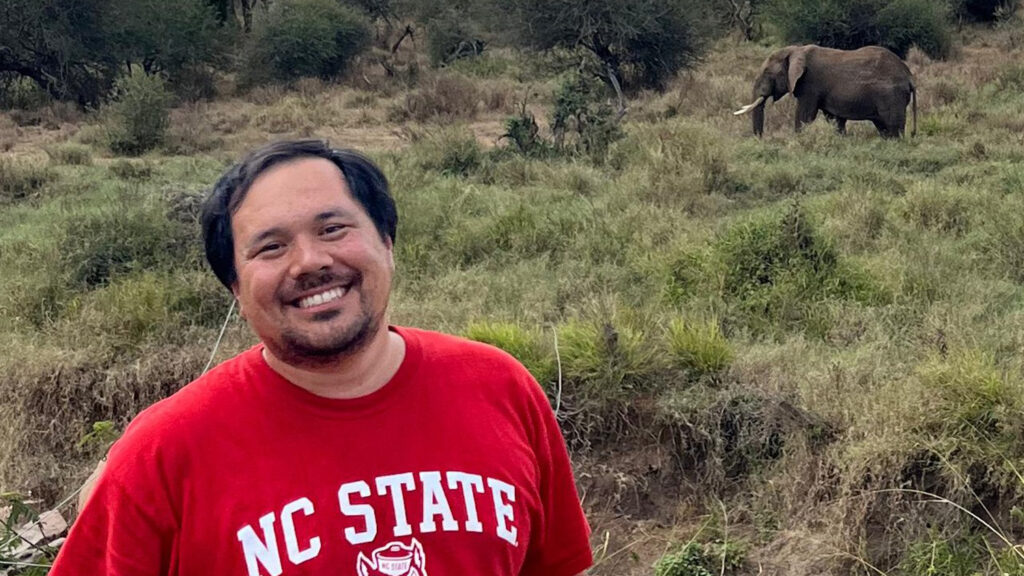Meet the Fall 2024 Student Commencement Speakers
The NC State College of Natural Resources has selected two student speakers for its fall 2024 commencement ceremony on Friday, December 13.
Sydney Tomlin and Matthew Snider will take the stage at the McKimmon Center to reflect on their personal journeys and share their perspectives with their fellow graduates.
Read below to learn more about the fall 2024 commencement student speakers.
Sydney Tomlin

Tomlin is graduating with dual bachelor’s degrees in paper science and engineering and chemical engineering. During her time at NC State, Tomlin gained more than a year of professional work experience through internships at Westrock, Amgen and Parker Lord, where she developed an equipment capabilities database, implemented a recycling system in manufacturing, and ensured compliance with environmental standards.
Tomlin has also been actively involved within the NC State community. She not only served as a teaching assistant for introductory engineering classes, but she also held leadership roles for the Technical Association of the Pulp and Paper Industry, Operation Christmas Child Club and the International Society of Pharmaceutical Engineers. Tomlin also participated in an alternative service break to Rwanda in East Africa, promoting engineering education in rural areas.
When asked about her NC State experience, Tomlin said the emphasis on hands-on learning in the Paper Science and Engineering program has been “pivotal in shaping my career as an engineer.”
“The combination of a solid textbook education and real, hands-on labs allowed me to see concepts come to life,” she said.
In PSE 371, for example, Tomlin and her classmates worked with wood chips through various unit operations of the papermaking process. And in PSE 465, they learned how to use Lean Six Sigma tools to improve processes.
Tomlin added that the program’s professional development opportunities — which included resume building and networking — were also “particularly beneficial as I navigated various internships throughout my college journey.”
“I was able to secure an engineering internship just a month after starting at NC State, and I had a polished resume ready even before moving into my dorm,” Tomlin said.
After graduation, Tomlin will work as a process contact engineer for ExxonMobil in Houston, Texas. ExxonMobil is one of the world’s largest energy providers and chemical manufacturers. Tomlin is excited to contribute to making energy more accessible and sustainable around the world.
“At the root of my professional goals, I hope to live a life of service. Energy is the driving force behind the advancement of society. With this incredible reach comes great responsibility, and I am eager to contribute to a cause that impacts people on such a large scale. This position with ExxonMobil will allow me to help make energy more sustainable and accessible around the globe,” Tomlin said.
Matthew Snider

Snider is graduating with a doctoral degree in fisheries, wildlife and conservation biology. He previously earned a bachelor’s degree in animal sciences from the University of Maryland in 2009 and a master’s degree in fisheries, wildlife and conservation biology from NC State in 2019. His graduate research has largely focused on wildlife movement, large mammal communities and human-wildlife interactions, particularly in sub-Saharan Africa.
Before enrolling at NC State, Snider spent nearly five years in Kenya as a project manager at Mpala Research Centre and Maasai Mara National Reserve. There he conducted research on gazelles, lions, hippos and high-elevation mammal communities. During his time at NC State, Snider completed three field seasons in Namibia and an extended field season in Zambia, conducting research and networking with locally-based conservation management groups.
When asked about his NC State experience, Snider said the College of Natural Resources was “a great place to developed valuable academic research skills under the tutelage of a diverse faculty.” His advisor was Roland Kays, a research professor in the Department of Forestry and Environmental Resources.
Snider added that the College of Natural Resources “fostered a positive, collaborative environment rather than an internally competitive academic atmosphere, which resulted in skill-sharing and cross-disciplinary collaborations that increased the complexity of the research achieved there.”
After graduation, Snider will return to sub-Saharan Africa through a four-year, postdoctoral research fellowship with the Max Planck Institute to study baboon behavior and movement ecology in northern Kenya. He will also serve as a mentor to Kenyan graduate students, building on his passion for supporting the expansion of African-led, African-skilled, internationally-partnered conservation initiatives through capacity building and collaborative research.
“Throughout my eight years living and working in East and Southern Africa, and continuing through my graduate school experience, I have developed skills and networks where I feel like I can meaningfully contribute to capacity building and collaboration for the highly motivated, but under resourced, wildlife ecology efforts on the African continent,” Snider said.
- Categories: